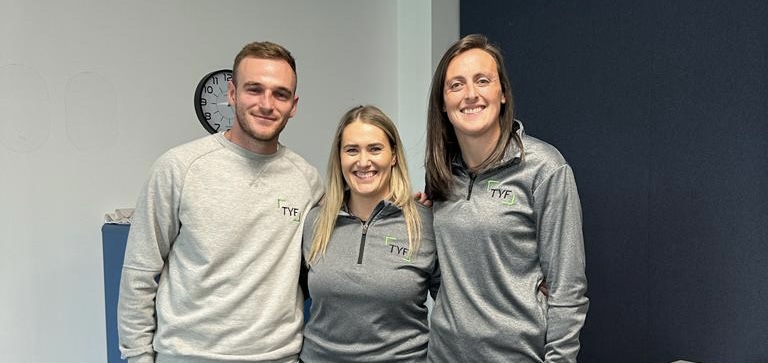News
Gráinne Finnegan: People over Paper

As TYF Campaign Manager, Gráinne Finnegan draws on her varied experience to bring the best out of the initiative.
I have always had a deep desire to help and support people. Initially, I thought the best way to do this would be in the shaping of policy so I did a Masters in Human Rights and Social Policy before moving to Brussels to work in the European Parliament. However, I felt there was a disconnect between the written policy and what is experienced by people on the ground. Based on this I decided to move into frontline work to get a deeper understanding of the day-to-day realities of policy implementation.
Over the past decade I have worked in agencies such as Focus Ireland and Túsla where I gained valuable experience in supporting children and families through crisis, dealing with issues ranging from addiction and mental health, to domestic violence and homelessness. I worked with individuals from areas of the deepest deprivation in Ireland, and also those from affluent neighbourhoods who hold down senior roles in well-established companies. It was a humbling experience, affirming to me that none of us are immune to facing challenges in life.
Through this it soon became clear to me that I preferred to work with people over paper. Frontline work ignited my passion for one-to-one client support, which I continue today in my wellbeing-coaching and teen-coaching career through my business, Santosha Wellness Studios. This work has proved to me that everyone has their own unique story, and although they may present with a smile on their face, we may never know the turmoil a person is experiencing in their life.
This brings me nicely to Tackle Your Feelings (TYF) and how important it is to be sound. Everyone should be treated with the same empathy, respect, kindness and non-judgmental support. On reflection, my experiences have shaped my commitment to mental health and wellbeing using a holistic approach and a focus on early intervention. This in turn laid the foundations for my approach to TYF. I believe the Tackle Your Feelings Schools Programme can change the lives of our teenagers. As a programme, it provides teachers with robust wellbeing content to deliver within their school, empower young people and encourage them to be proactive about their mental wellbeing.

Taking Control with TYF
I first came into contact with TYF through my work in the wellness field as I was developing Santosha Wellness. I offer a range of wellbeing services such life-coaching, yoga, meditation and wellbeing retreats. Many of my clients work in high-stress environments, are experiencing a turbulent time in their lives or are teenagers needing support in self-esteem, emotional regulation and confidence.
When the opportunity to work with TYF arose, it seemed like the ideal opportunity to learn from elite athletes who are at the peak of their game. I always enjoyed rugby as a sport and went to a few games but aside from the Kearney brothers coming from my neck of the woods, my knowledge of the sport would have been limited.
GAA was just the way of life growing up in Jenkinstown in the Cooley Mountains. I played for Louth across various teams until illness and a series of bad injuries cut my sporting dreams short. While I continue to play with Geraldines GFC in Haggardstown, I have had to accept that my intercounty career is now a distant memory. Nevertheless, I hold tightly onto those memories and often share a laugh with my old teammates about them. This is the amazing thing about sport; it brings people and communities together.

More Than A Player
As popular as rugby is in Ireland, it is still a growing sport in some parts of the country and so I believe one of TYF’s biggest challenges is in transcending the traditional barriers associated with the game. One of the things I have been keen to impart is that TYF has a universal application independent of its connection to rugby, which is often a strong misconception. This is why we have been making inroads in secondary school curriculums across the country and not just placing our focus on the fee-paying rugby schools.
The TYF team has a keen awareness of the campaign’s strengths and weaknesses. Self-awareness, of any form, is vitally important in all aspects of life. We know that we are leveraging the popularity and profile of Ireland’s rugby players to support the campaign but it is our ultimate goal to be seen as a valuable wellbeing resource regardless of Ireland’s rugby success on the field.
Why do we lean on rugby players then? Rugby has always been considered as one of the world’s toughest sports. It’s a battleground with little room for vulnerability. Yet in knowing the players as we do through Rugby Players Ireland, we want to turn that perception on its head and acknowledge players as people first, each of whom will face their own day to day challenges regardless of how invincible they may seem.

Role Models
While our primary focus is on the TYF Schools’ Programme, I believe TYF must also strive to permeate workplaces and communities nationwide. This is where our role models can have a profound impact. It reminded me of a piece of content released by HerSport that underscored the importance of providing visibility to inspiring individuals. It depicted young girls readily recognising images of male athletes but struggling to name their female counterparts. The piece highlighted the alarming statistic that only 6% of media coverage is dedicated to women in sport.
While some of our ambassadors might have a decent public profile and will be recognised in most parts of the country, there is also a dedicated army of TYF champions behind them who support the campaign’s message in their own networks with many visiting their former schools to open a discussion on the topic of mental wellbeing. As we touh upon more and more communities, it is our view that we can amplify TYF as a universal tool and further reduce the stigma regarding mental health and wellbeing.
While ground has been made in this respect, a study conducted by NUI Maynooth and Trinity College Dublin (2022) found that 42% of Irish adults have a mental health disorder of some form, while 1 in 10 have attempted suicide. These stark figures remind us of the importance of an early intervention model.
Thoughout my time with TYF, my interactions with the players have been enlightening and enriching, each in their own way. I greatly admire the likes of Nick McCarthy who shared his experience of coming out in our recent collaboration with the URC. It was refreshing to hear Nick speak so positively about. His perspective can serve as inspiration to those who might need more encouragement in the embracing of their authentic selves.
I felt that it was only when Nick chose to share his story that he began to realise how empowering it could be. Sometimes I wonder whether the players fully grasp how influential they can be. Their varied experiences can break down barriers as well as showcasing that the benefits of TYF extend beyond challenging times.
Holisitic Approach
I am grateful to have grown up in a household that embraced holistic therapies. Even though my brothers would still tease me about ‘air-fairy’ meditating, it is a wellbeing tool I use daily. Research now proves that it helps soothe our over-stimulated sympathetic nervous system (our fight or flight state), which we activate with day-to-day stresses.
Exercising the mind is as important to me as a weights session is in building physical strength. Yoga is also an amazing tool to tune into our bodies and mind. I have had many people come to me stating they would love to begin yoga but are worried that they are not flexible enough, I remind them that they are breathing so they are already practicing yoga.
A difficult period in my life made me truly appreciate the tangible importance of wellbeing. I found solace in various wellbeing tools, in discussing my feelings openly and in seeking support when needed. Although I have great self-awareness and knowledge, this was challenging. I was used to being the practitioner supporting others through difficult times and I had to allow myself to be vulnerable. From my learnings I decided to formalise my knowledge through the establishment of my business Santosha Wellness Studios last year as a means of helping others navigate their own paths toward holistic wellbeing.
There are also skills I have learned during my time with TYF which effectively showcase the robust mental wellbeing toolkit of an elite athlete. For instance, I have huge admiration for their “next ball” mentality. Players constantly learn from their mistakes on the go, while they remain focused on the present moment. This ‘next-ball’ mindset can go beyond sport and applies to awareness, personal growth and wellbeing as well.
I have also learned a great deal from my colleagues at Rugby Players Ireland. For me, one of the best things about working with RPI is ‘our team’. We may not be elite athletes but my team-mates are certainly elite in the dedication to their work and the genuine care and support they have for each of our players. With an amazing team culture, Rugby Players Ireland has become an extension of my own support network.
As we navigate the inevitable ups and downs of life, we may feel pressure to conform or perform. Perhaps take this as a reminder – that to be yourself in a world that is constantly trying to make you something else, is the greatest accomplishment. You are enough, you have enough, and you do enough.
References:
Back to NewsLatest Posts

Inaugural Past Players Padel Tournament

The Ireland Sports Fund

Making Tracks

















